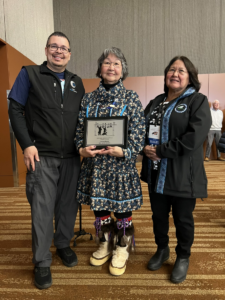Nita Yurrliq Rearden, Leader From the Region
Calista Culture Bearer Recognized with AFN Award
Storyknife, November/December 2023 edition
Nita Yurrliq Rearden of Kotlik received the prestigious AFN President’s Culture Bearer Award at the Alaska Federation of Natives convention in October for her work in education and the Yup’ik language. Yurrliq also received the 2023 Calista Culture Bearer Award in May.
“We learn from our Elders, we learn from our mistakes. We learn from our stories, we learn from education,” says Yurrliq.
Yurrliq [YUUH-lik] was born in Kotlik to Frederick Yugissaq and Pauline Igvaq (Kameroff) Prince. She is the third oldest of 14 siblings, and the oldest girl. For a short time, she was raised by her grandmother, Theresa Nanirkuqsuar Kameroff, who taught her many traditional activities including sewing, subsistence gathering and Yup’ik values.

Nita Yurrliq Rearden (center) with Thom Leonard, Calista VP of Corporate Affairs (left) and Margaret Pohjola, Calista Board Vice Chair (right).
Her first education began at home, where her grandparents and parents spoke to her entirely in Yup’ik, teaching her how to live by traditional Yup’ik values. She and her husband have four children and six grandchildren, and she brings her cultural knowledge with her in everyday activities.
“Yup’ik is my first language and English is my second language, and in this day in age I feel it is important to know both to survive in the modern world,” Yurrliq says.
Yurrliq attended boarding school at St. Mary’s High School. Then she received her Bachelor of Education from the University of Alaska Fairbanks. She taught Kindergarten, First Grade, and Yup’ik language classes in Bethel and Kotzebue. In these early years, she recognized a need to bring in the Yup’ik culture and knowledge into the classroom and developed a “Fish Camp” unit for elementary students.
“To be bilingual is additive to our way of thinking. Monolingual means you only know one way. In order to know two ways, learn two languages,” Yurrliq says.
Yurrliq earned her Master of Arts in Cross Cultural Studies in 2006 and retired from the Lower Kuskokwim School District in 2011. She is currently working with educators to develop cultural lessons for the Lower Yukon School District (LYSD) and help LYSD revitalize the Yup’ik language and cultural values.
One of her most recent projects is working on the curriculum that incorporates the Yup’ik word Pulasaraq [Boo-LAH-saw-UHK] which translates in Yup’ik to a “path through the trees.” It aims to help students find their way through education and life by utilizing the teachings of our Elders, in the same way they had to make a trail through the willows and the tundra to get safely from one village to the next.
Monolingual means you only know one way. In order to know two ways, learn two languages.
Nita Yurrliq Rearden
“When we asked our Elders what they would like our students to learn in school, we expected them to respond with science, reading and math. One Elder said, ‘I want my children to grow to become human beings,’” says Yurrliq.
“We worked to incorporate the Yup’ik way of life with themes related to subsistence, storytelling and using place-based education.”